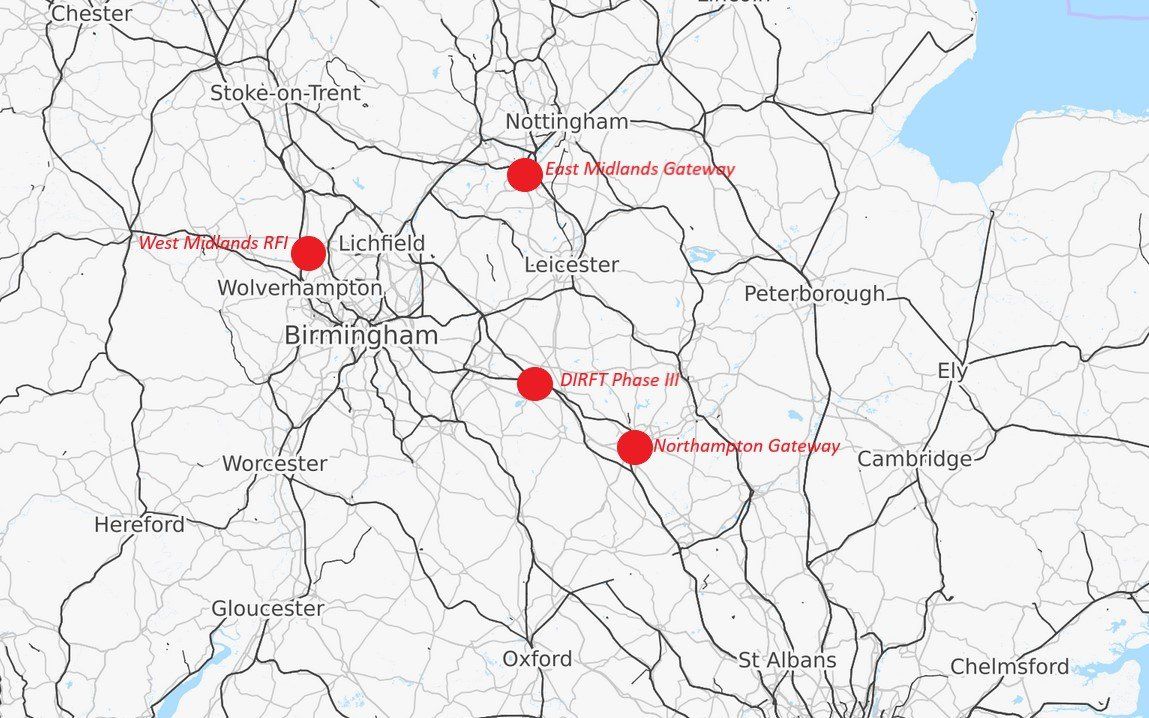
West Midlands Rail Freight Interchange
On 4 May 2020, the Secretary of State for Transport issued a Development Consent Order (DCO) granting planning permission for the West Midlands Rail Freight Interchange (WMRFI) , a new Strategic Rail Freight Interchange (SRFI) near Four Ashes in South Staffordshire. The development will provide for a new intermodal terminal connected to the West Coast Main Line capable of handling trains up to 775m length, alongside circa 745,000 square metres of modern logistics warehousing and other associated facilities.
The WMRFI is the latest SRFI proposal to be granted a DCO. Over the past few years four schemes (as shown in the map below) have now been consented using the process proscribed by the Planning Act 2008; when fully developed these schemes will provide around 2.5 million square metres of rail-served logistics floor space. Two further SRFI proposals providing a further 1.5 million square metres, namely Hinckley RFI and East Midlands Logistics Park near Derby, are in the process of applying for a DCO.
Map: Recent DCOs for SRFIs

Two important points can be drawn from the WMRFI decision. Firstly, the Planning Act 2008 was introduced to enable ‘nationally significant infrastructure projects’ or NSIPs to be granted planning consent reasonably swiftly, albeit after detailed examination, overriding any objections at the local level. SRFIs are considered NSIPs as they promote the transfer of goods from road transport to rail freight. In addition to the generating supply chain cost savings, they will play an important role going forward in de-carbonising freight transport. Given that all four SRFIs considered under the Planning Act 2008 have been granted DCOs, it would appear that the process is working as intended. SRFI proposals near Slough (SIFE) and Dartford (Howbury Park) were both refused consent after lengthy consideration under the older Town and Country Planning Act process, and it is probable that all four SRFIs recently granted DCOs would also have been refused had they endured lengthy public inquiries with strong objections by the respective local authorities.
Secondly, in 2019 MDS Transmodal produced an updated set of rail freight demand forecasts for Network Rail (to 2043/4). The forecasts estimated significant growth in demand for rail freight services to 2043/4. Under the central scenario (E), total rail freight is forecast to grow from 85.8 million tonnes in 2016/7 to 147.7 million tonnes by 2043/4 (+72%). For the Ports intermodal category, demand is forecast to grow from 16.2 million tonnes in 2016/7 to 42.9 million tonnes by 2043/4 (+165%). However, the forecast growth is in part predicated on the development of additional SRFIs nationally (5.2 million square metres to 2043/4 for the central scenario at various locations). It is also worth noting that all four SRFIs recently granted DCOs were included in that national total. It is therefore welcome that schemes which are vitally important to the continued growth of rail freight are being granted consent, and in a manner which avoids lengthy public inquiries.
